Spectres & Souls
It is now over three and a half years since Xu Zhangrun called on the Chinese authorities to re-evaluate the tragic events surrounding 4 June 1989, the Beijing Massacre. That appeal, like similar calls issued by others over the decades, was ignored.
We mark 4 June 2021 and mourn the fall of Hong Kong by reprinting Xu Zhangrun’s mournful mediation on the rivers of blood that buoy up the Chinese state. It appeared in these virtual pages on 4 June 2020 under the title ‘In Memoriam — Shrouds of Ice on a River Incarnadine’ as a chapter in China Heritage Annual 2020: Viral Alarm. It is reprinted here as part of China Heritage Annual 2021: Spectres & Souls.
***
In this anguished prose-poem mention is made of an elder brother — ‘starved to death in those boisterously halcyon days’ — and a father, ‘bound and dragged off without warning, long gone and no whisper of news’: harrowing details from the writer’s early years.
***
In the introduction to Spectres & Souls we noted that while 1 July 2021 marks the centenary of the founding of the Chinese Communist Party, 1 June 2021 is the centenary of the Tulsa Race Massacre in the neighborhood of Greenwood, Tulsa, Oklahoma. Below, we start our commemoration of the Beijing Massacre of 1989 by quoting remarks made by Joseph Biden, President of the United States, on 1 June 2021 in Tulsa. As Biden observes — words that leaders, thinkers, propagandists and average citizens in the People’s Republic of China would be advised to take to heart:
‘For much too long, the history of what took place here was told in silence, cloaked in darkness. But just because history is silent, it doesn’t mean that it did not take place. And while darkness can hide much, it erases nothing. It erases nothing. Some injustices are so heinous, so horrific, so grievous they can’t be buried, no matter how hard people try.’
As Biden was delivering his remarks in Tulsa, one hundred American scholars of democracy issued a ‘statement of concern’ appealing for the integrity of an election process endangered by the machinations of state legislatures controlled by the Republican Party.
— Geremie R. Barmé
Editor, China Heritage
4 June 2021
2021年6.4祭日
Related Material:
- Geremie R. Barmé, ‘Supping with a Long Spoon — dinner with Premier Li, November 1988’, China Heritage, 10 December 2018
- On the Eve, April 1989 — Watching China Watching (XIII), China Heritage, 29 January 2018
- G. Barmé, ‘Beijing Days, Beijing Nights, May 1989’ (1990), reprinted in China Heritage, 4 June 2021
- Orville Schell, ‘China’s Spring’, The New York Review of Books, 1 June 1989
- G. Barmé, Confession, Redemption, and Death: Liu Xiaobo and the Protest Movement of 1989, 1990 & in Chinese at: 忏悔、救赎与死亡:刘晓波与八九民运, 石默奇译
- G. Barmé, ‘The Gate of Darkness’, China Heritage, 4 June 2017 (updated 31 May 2019)
- Anthony Tao, ‘Tiananmen Square 30 years on: 30 essential stories about June 4, 1989’, SupChina, 4 June 2019
***
Tulsa, Oklahoma
1 June 1921-2021
You know, there’s a verse in First Corinthians that says, “For now, we see in a mirror dimly, but then, face to face, now I know in part, then I shall know fully.”…
The events we speak of today took place 100 years ago. And yet, I’m the first President in 100 years ever to come to Tulsa — (applause) — I say that not as a compliment about me, but to think about it — a hundred years, and the first President to be here during that entire time, and in this place, in this ground, to acknowledge the truth of what took place here.
For much too long, the history of what took place here was told in silence, cloaked in darkness. But just because history is silent, it doesn’t mean that it did not take place. And while darkness can hide much, it erases nothing. It erases nothing. Some injustices are so heinous, so horrific, so grievous they can’t be buried, no matter how hard people try.
And so it is here. Only — only with truth can come healing and justice and repair. Only with truth, facing it. But that isn’t enough. …
My fellow Americans, this was not a riot. This was a massacre — (applause) — among the worst in our history, but not the only one. And for too long, forgotten by our history.
As soon as it happened, there was a clear effort to erase it from our memory — our collective memories — from the news and everyday conversations. For a long time, schools in Tulsa didn’t even teach it, let alone schools elsewhere. …
We can’t just choose to learn what we want to know and not what we should know. (Applause.) We should know the good, the bad, everything. That’s what great nations do: They come to terms with their dark sides. And we’re a great nation.
The only way to build a common ground is to truly repair and to rebuild. I come here to help fill the silence, because in silence, wounds deepen. (Applause.) And only — as painful as it is, only in remembrance do wounds heal. We just have to choose to remember. …
We memorialize what happened here in Tulsa so it can be –so it can’t be erased. We know here, in this hallowed place, we simply can’t bury pain and trauma forever.
And at some point, there will be a reckoning, an inflection point, like we’re facing right now as a nation. …
— from ‘Remarks by President Biden Commemorating the
100th Anniversary of the Tulsa Race Massacre’, 1 June 2021
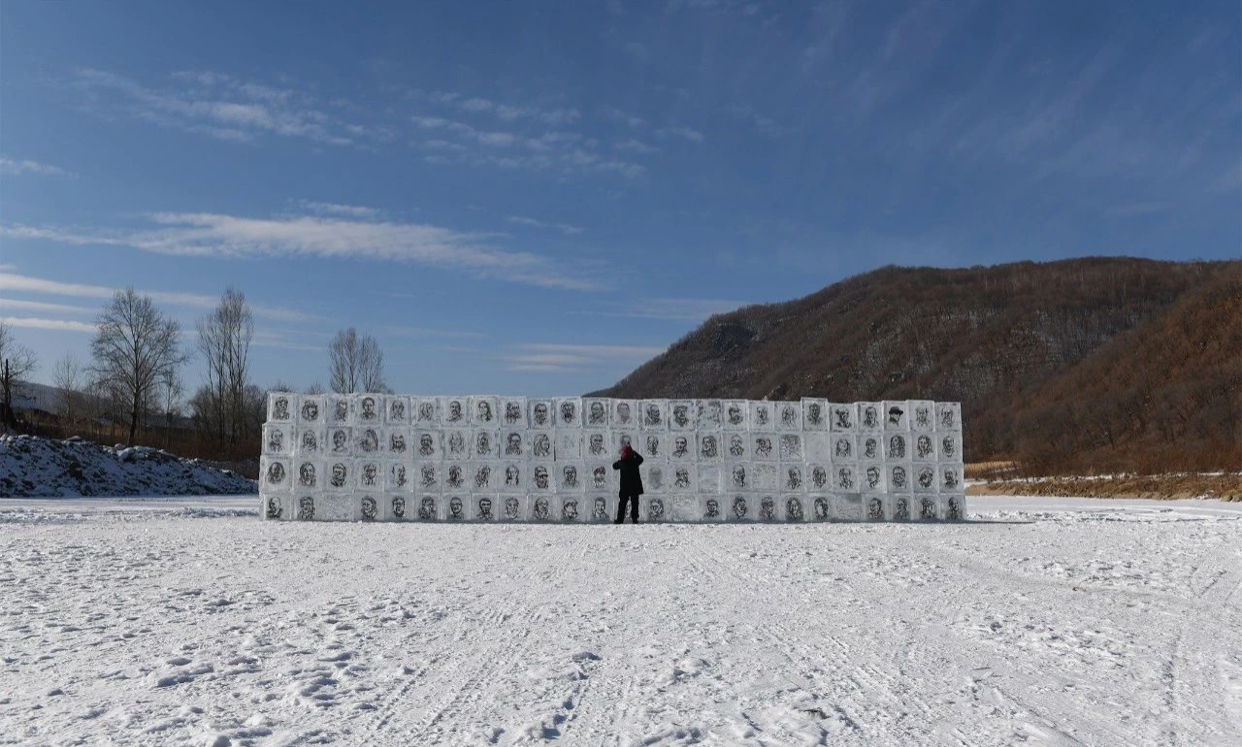
***
Long rolling waves of time
bring all things to light
and plunge them down again
in utter darkness.
— Sophocles, ‘Ajax’ Αἴας
trans. James Scully
***
A Democracy of Grief
In early February 2020, Professor Xu Zhangrun published an excoriating essay about China’s mishandling of the coronavirus epidemic in Wuhan. Building on a series of searing analyses written from 2016, Xu’s essay ‘When Fury Overcomes Fear’ offered a further critique of the political crisis of the Xi Jinping era. He identified the core of the problem as being one-man rule and the Communist party-state. As he wrote:
‘It is a system that turns every natural disaster into an even greater man-made catastrophe. The coronavirus epidemic has revealed the rotten core of Chinese governance; the fragile and vacuous heart of the jittering edifice of state is thereby on display as never before.’
China itself was now dominated by:
‘…an evolving form of military tyranny that is underpinned by an ideology that I call “Legalistic-Fascist-Stalinism” [Fa-Ri-Si 法日斯], one that is cobbled together from strains of traditional harsh Chinese Legalist thought [Fa 法; that is, 中式法家思想] wedded to an admix of the Leninist-Stalinist interpretation of Marxism [Si 斯; 斯大林主義] along with the “Germano-Aryan” form of fascism [Ri 日; 日耳曼法西斯主義].’
— from Xu Zhangrun, ‘When Fury Overcomes Fear’
China Heritage, 24 February 2020
Shortly after ‘When Fury Overcomes Fear’ appeared, Xu Zhangrun was placed under informal house detention and his contact with the outside world was blocked. As he was recovering from an unrelated medical emergency he was granted permission to travel to his family home in Anhui province where his ninety-year-old mother was being treated for cancer. During his sojourn in the south, Professor Xu composed the following prose-poem. The Chinese original has only been circulated as a ‘WeChat samizdat’.
With Xu Zhangrun’s permission, we offer this meditation in sombre commemoration of the Beijing Massacre of 3-4 June 1989.
***
Xu Zhangrun’s work lives at that boundary where prose is uplifted to become poetry and, in so doing, the author addresses a moment in eternity in words that also make that moment eternal. The style is challenging, the language replete with references, be they immediate (the author alludes to his family and recent personal dramas) or literary and, apart from gestures in the direction of historical incident, the writer includes lines and phrases from a range of works, a few of which we note. He also sets his sights on the politics of the day.
‘Wall of Ice’ 封凍之牆 was a sculpture cum art performance created in late January 2020 by Ai Song 艾松, a Beijing-based artist. A work built in the mode of ‘land art‘, the site-specific installation was made from material drawn from the immediate environment in combination with sculptures fashioned by the artist. It was built to be undone.
Pellucid slabs of ice were hewn from a frozen river and layered to construct a storied prison for the incarceration of effigies sculpted from barbed wire, the artist’s preferred medium. The images included men and women of conscience, both living and dead. Among their number are martyrs like Zhang Zhixin 張志新, the Nobel Laureate Liu Xiaobo 劉曉波, the renowned reformist Bao Tong 鮑彤, The Tiananmen Mothers, the novelist Yang Xianhui 楊顯惠, as well as other writers, academics and many others persecuted by Communist Party fiat. Nine of Ai Song’s original one-hundred sculptures were censored by the authorities. As a result the ‘wall of one hundred’ contains only ninety-one images. Xu Zhangrun’s image remained untouched and perhaps his words can help fill in the nine ‘memory holes’ created by the official interdiction.
The Wall of Ice stood for twenty-four hours following which Ai Song dismantled the edifice, releasing thereby the prisoner-avatars whom he had confined therein. Xu Zhangrun’s commemoration of the Wall of Ice offers permanence to that evanescent memorial by means of the written word, arguably the most hallowed tradition of Chinese culture.
The artist’s work is further transformed by the writer’s alchemy that transforms the particulars of today into a work relevant to a time yet unknown and unimaginable. Such word-memorials are written in a style that draws both on a millennia-old heritage and modern sensibilities. The result is what I have previously refered to as an ‘intersection with eternity’. Xu Zhangrun’s meditation is an impossible celebration; it is an elegy for human striving in the face of inhumane obstacles.
***
This bilingual text is published at a time of anguish, in Hong Kong, in Beijing, throughout the United States and in many other parts of the world. Many people are sharing in what Jelani Cobb, in the specific context of racism in America, calls a ‘democracy of grief’. It is one that can bind ‘those of us who survive people who were violently dispatched from this life.’ As Erin Overbey, archive editor of The New Yorker, asks:
‘How can you recover and move forward… when a wound is never fully allowed to heal?’
In the People’s Republic of China the democracy of grief, like representative democracy itself, as well as a range of basic rights, is outlawed.
***
‘Shrouds of Ice, River Incarnadine’ is a chapter in China Heritage Annual 2020, the theme of which is ‘Viral Alarm’. It is also included in our Xu Zhangrun Archive.
— Geremie R. Barmé
Editor, China Heritage
4 June 2020
2020年6.4祭日
***
In Memoriam
In ‘Imminent Fears, Immediate Hopes’, his unsparing analysis of China’s socio-political predicament published in July 2018, Xu Zhangrun made an appeal to the authorities:
“Overturn the Verdict on the ‘4th of June’ [1989 Beijing Massacre]. Over this and next year China will mark a series of sensitive anniversaries: it will be the fourth decade since the policies of [what would become known as] the Reforms and Open Door, the centenary of the May Fourth Movement [of 1919, a major feature of which was modern student activism and strident patriotism; it was also a contributing reason for the founding of the Chinese Communist Party in 1921], as well as the thirtieth anniversary of 4 June. The upshot of the Sino-US Trade War will extend through this period and will only serve to add to the uncertainty of things.
“In pursuit of the usual posture of Stability Maintenance [the authorities will daresay] ‘use policing methods to deal with political issues’ in the process of which they will ‘deploy the mechanisms of the state machine [政制] to clamp down on [鉗制] the political situation [政治]’. The system will go to extremes rather than approaching matters by ‘dealing with politics by employing politics [to resolve matters]’ [as we witness in the West when they deal with difficult political issues]. Back in the day, the ‘5th of April’ [1976 Tiananmen Incident when protesters flooded to Tiananmen to mourn the recently deceased premier Zhou Enlai and denounced Mao and his coterie, later known as the ‘Gang of Four’] was re-evaluated [literally, ‘rehabilitated’] and ever since then that date has no longer been one of any particular political sensitivity. This was precisely because [after Mao’s death, the authorities] ‘confronted a political problem by employing a political solution’ — as the old saying puts it: ‘when an army approaches a good general knows how to block its advance; when the waters rise we know how to sandbag against flooding’. Everyone took from that [decision regarding the 5 April 1976 Tiananmen Incident] what they wanted and all were satisfied.
“That’s why, in light of the upcoming thirtieth anniversary of 4 June [in 2019], I would encourage Those In Power to find a suitable moment either this or next year to rehabilitate ‘4 June’ publicly [that is, to re-evaluate an event which is still officially classified as a necessary military action launched to quell a ‘counter-revolutionary rebellion’ by hooligans in Beijing against the Chinese state with the aim of toppling the Communist Party]. This would not only demonstrate a sincere and wise application of the principle of ‘politics embracing the political’, it would also mean that from then on there would be no need to treat the 4th of June every year like a political emergency. [The authorities, that is Xi Jinping] would clear the way for all Chinese to enjoy a peaceful coexistence, it would uplift people psychologically and benefit [the party-state] by accruing political capital to its legitimacy.”
第八,平反「六四」。今明兩年,適值「改開」四十週年、「五四」百年與「六四」三十週年,一連串所謂敏感節點紛沓。而中美貿易戰的後果,亦將延時第次顯現,增加了所謂的不確定性。在此,既有的「維穩」思路是「以治安對付政治」,疊加上「用政制鉗制政治」,而非「以政治迎應政治」這一常態政治之道。當年給「四五」平反,從此每年四月五號不再成為敏感節點,就在於「以政治迎應政治」,兵來將擋水來土掩,結果各得其所,皆大歡喜。因此,值此迎來「六四」爆發三十週年之際,當局於今明兩年適當時刻公開為其平反,不僅表明「以政治迎應政治」的誠意與智慧,而且,從此每年六月四號無需再如臨大敵,為全體公民政治上的和平共處掃清障礙,既裨益於民心舒暢,更有助於收拾政治合法性。
— Xu Zhangrun
許章潤
***
Related Material:
- Simon Leys, ‘After the Massacres’, The New York Review of Books, 12 October 1989
- The Gate of Heavenly Peace, Boston: Long Bow Group, 1995
- ‘The Gate of Darkness’, China Heritage, 4 June 2017
- ‘Mourning’, China Heritage, 13 June 2017
- ‘A Writer’s Desk & the Vastness of China’, China Heritage, 4 June 2019
- ‘藝術家艾松 | 他把100塊冰封人物壘成的牆砸碎之後…’, 2020年2月17日
- 杜曦雲, ‘封凍和釋放——艾松的儀式營造’, 2020年2月19日 (for a version including short videos, see here)
- Xu Zhangrun 許章潤, ‘When Fury Overcomes Fear’, China Heritage, 24 February 2020
- Perry Link 林培瑞, ‘为什么要纪念 #六四 “Why must you remember June Fourth?” ’, YouTube, 2 June 2020
- Xu Zhangrun Archive, China Heritage, 1 August 2018-
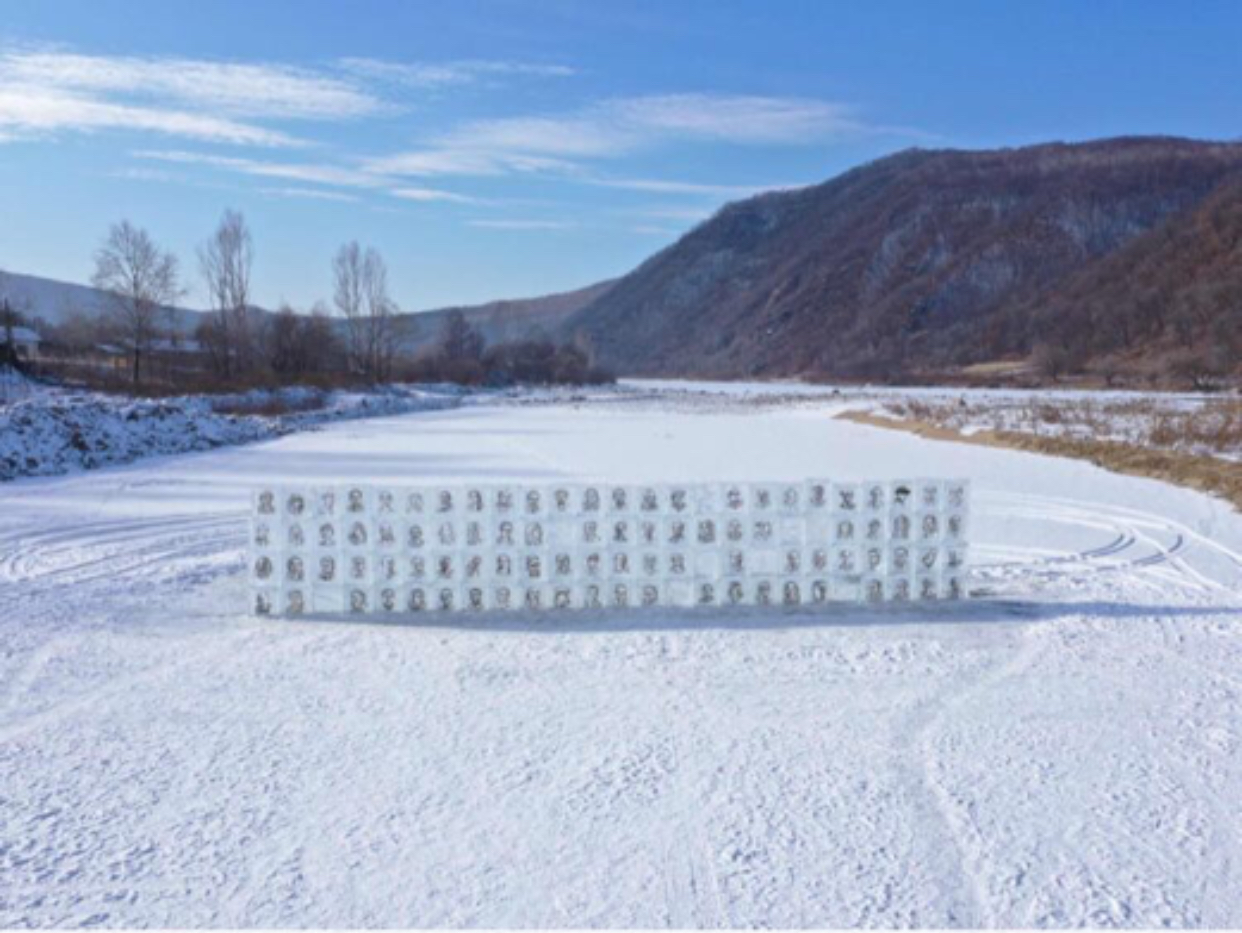
***
An Ice-Shroud for Lost Souls
Cast on a Torrent of Blood
魂如縞素血如江
Xu Zhangrun
許章潤
Translated by Geremie R. Barmé
Thus have I heard:
On the 20th of January 2020, the celebrated artist Ai Song constructed a wall out of one hundred blocks of ice. The bricks were chiseled from the gelid waters of the Hailang River at a place once known as Ningguta, a hyperborean clime that is one of the coldest in China. Each block contained a niche in which the artist placed a sculpted portrait that he had fashioned from old barbed wire collected from labour camps.
Over the following twenty-four hours, the Wall of Ice was baptised by the winter light in a place of unforgiving cold. At sunrise on the second day, Ai Song dismantled the Wall brick by brick and, with his icepick, he then chiseled free those ice-caged portraits, one by one. As the authorities had confiscated nine of the original one hundred effigies, there were only ninety-one portraits to free; the disappeared were represented by their empty ice coffins.
耶誕兩千二十年一月二十日,著名畫家艾松先生將利用監獄廢棄鐵絲網鑄造的當代中國百人頭像,于祖國東北極寒之寧古塔海浪河上,鑿冰取水,鑄模澆磚,冰封其中,再堆砌成牆。歷經一日一夜之光影變幻,風水洗禮,寒流作伴,日升時分,作者手揮鐵斧砸碎冰牆,收回人像。百幅頭像,前為有司奪沒其九,冰凍其中的實為九十一幀。
***
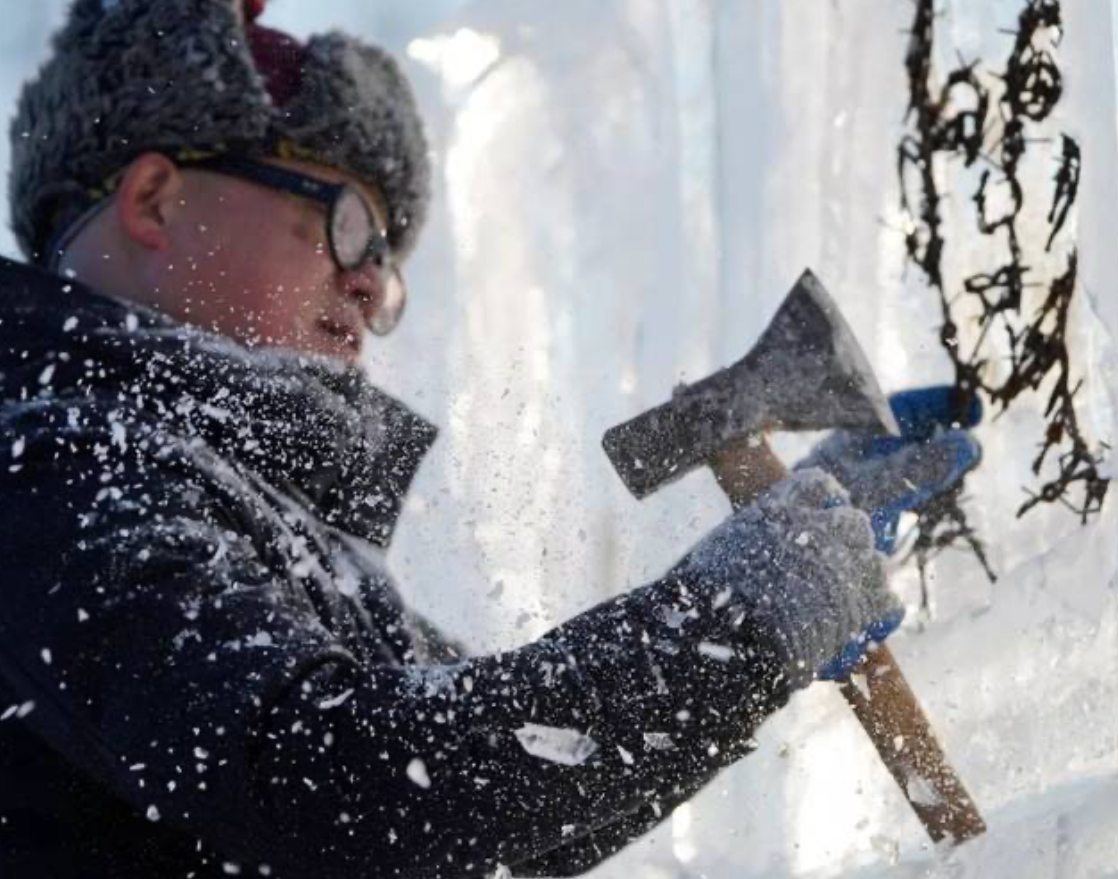
***
It was the lunar season of the Severe Cold in the Year of the Rat [20 January 2020]. At Hailang River the very earth and the skies themselves groan heavy with hoarfrost.
歲在己亥,時令大寒,海浪河,天地凍徹。
The Wall rose up, a shroud of mourning that spanned the vast skies that form a vault over our pitiless land. For a moment The Wall proffered a place of solace, one that gathered up in itself the incalculable sorrows of our nation’s creation. It confronted the merciless violence of this realm without flinching, crystallising it in a frozen moment of choked anguish, as breathless as ‘the noose draws around a throat pulsating with the lifeblood of freedom’. [Note: This is a line from Aleksandr Solzhenitsyn’s The Gulag Archipelago.] Remember: the bloody maw of hell had opened wide to engorge them, men and women made strangers in their own land. The words of their mother tongue become gibberish discouraged by the chattering mouths of the ruling vermin. We ourselves were lost.
它是一襲縞素,通天絕地,席天幕地,承載著創世大悲,直面這備受摧殘的人世,無言凝噎,只因“那為自由而顫動的喉嚨套上了絞索”。地獄張開血口,他們在祖國成了異族;狐鼠呱噪不休,母語中我們流離失所。
This Wall of Ice is like a shuttle whose shimmering weft traces a path through the warp of torment to complete a woven swathe of truth. Those powerful blows to the earth cleaved out jagged runnels of suffering, indelible furrows, the traces of the jostling lives of prisoners. That frozen vestment shrouds their stricken forms. Through days and nights all bear witness to the unflagging workings of the spindle. At the height of summer the ogival tomb entrance will give way and crumble.
它是生命的紡錘,用苦難這根紗綫通向真理的粗布。大地的撞擊使苦難的犁鏵在每個難友的命運上耕出一道道永不磨滅的深溝,粗布就是他們的裹尸布。日月經天,紡錘川流,諸子作證,墓地的拱門在那個盛夏坍塌。
The Wall of Ice is the ponderous caterpillar track etched into ground by an ineluctable vehicle, one that grinds bodies into bone meal, churning up the earth in its ever-forward motion. The carrion is served up at their banquets; flesh and blood a roseate tincture adorning the vanity dressers of the rich. Summer heat unrelieved by rain, through the countless years they are prostrate. Distant winter thunder a warning that those dark schemes cloaking the land are but a paltry, faded disguise.
它是沉重碾軋過來的履帶,將人骨碾成廟堂宴饗的齏粉,用血肉澆沃貴婦妝臺的玫瑰。夏季無雨,三萬六千個晝夜匍匐在地;冬季打雷,陰謀席捲故國早已妝殘。
The Wall of Ice is a gargantuan mill stone, one that grinds ever on, clearing a path for carriages destined for camps crammed with slave laborers. The dusty remains on the grinding mill steady a harp that sings an incantation to the end of days; everywhere chests swell in tremulous response. Give back the terror to those who have created it; sculpt the remains of the dead into a chalice in which an ice beam glints. A skull holds that cup aloft, it overflows with a violent outrage carried on a boreal wind, twisting, turning into the jagged shapes of a heavenly flame, shooting out, scorching the snow-bound plains of wanton acts and through the wastelands in which defeat is buried. Consume all of their lies in the flames, burn to a cinder that bloated muzzle, crepitate also ‘tous les silences de la terre‘.
[Note: This is a line from ‘Cantilène pour un joueur de flûte aveugle‘ by Marguerite Yourcenar.]
它是碾壓人骨的巨獸石磨,跟隨著遞解苦役犯的馬車而來。磨盤的灰燼裏豎琴奏響末世的符咒,地球上所有的胸膛山呼海嘯。把恐懼還給恐懼的製造者,把尸骨雕成寒光熠熠的聖杯。頭骨擎杯,盛起這北風呼嘯的狂暴,化作嶙峋的天火,噴向恣肆的雪原和折戟的荒漠,燒光謊言,燒光虛胖的槍口,燒光“大地上所有的沉默”。
The Wall of Ice is a lattice of spectral flashes, a crisscross made from piles of bones; in the impenetrable darkling night it is possible to glimpse the sweep of mountains and the expanse of sea. These souls, nephrite shards, on the tenebrous outer reaches of our land are silent witnesses weighed own by thought. They are a heaving sigh that resounds through the ages. A black wind scours the frozen river, whipping the golden serpent of light into a writhing dance, the bones lie broken now, so much scattered kindling. A multiverse of explosions resounding at the barbarous outskirts of civilisation that are lashed by wind and rain. Yet in these bodies spring’s hope rises still, irrepressible.
它是閃著磷火的累累白骨,雲天空廓,暗夜裡藍幽幽如山似海。碎玉的魂靈,在幽光的邊際兀自沉思,一嘆今古。冰河上刮著黑色的風,金蛇狂舞,大地骨瘦如柴。一千個宇宙炸裂,城邦的盡頭風雨飄搖,身體裏八方春意跋扈。
This Wall of Ice is the hair of loving mothers turned ashen by the agonies of experience. Entangled by a myriad of events: they were helpless as their babies starved to death in those boisterously halcyon days [of the Great Leap Forward]. That was my mother, too; the dead child my eldest brother. That myriad of entanglements. Then, without warning [in the Cultural Revolution], the call goes out to mobilise once more and the hunters set out to round up their hapless prey; dark shadows vie for advantage. Suddenly her husband, too, is bound and dragged off without warning, long gone and no whisper of news. The mountains had long been forced into submission while the thoughtless ones, men and women, carried on as before, oblivious to these realities. Harsh winds harsher still in that frosty world scoured the plains, yet the White-haired One remembers. That is why then, this Great Wall of Ice… But then it is but the feeble flame of a lantern on a windowsill, a mere flicker of insubstantial light that can offer no resistance, or it is as a plaintive recitation heard in snatches from some distant, unfamiliar village.
它是母親那用苦難濡染的白髮,千絲萬縷,只因爲風和日麗眼睜睜看著嬰兒餓死在懷中。這是我母親的遭遇,餓死的是我的三哥。萬縷千絲,冬夜裏驟然響起圍獵的口哨,黑影憧憧,丈夫瞬間就被綁走,一去無消息。山峰早已馴服,世上的男女快快活活。原上的風霜,只有這白髮還有記憶。於是,這冰墻啊……啊如窗臺上的油燈隨風明滅,仿佛不堪折磨的形骸,在遠方陌生的村莊吟游逶迤。
This Wall of Ice is a lake secreted in a vast forest, one surrounded by autumnal hues. Profound beyond measure, transparent to its depths, its surface undisturbed by ripples. In its capacious volume it can take in the countless sorrows and joys of existence itself. The snow-bound immensity, like a serpentine garden of many aspects, witness to a hundred generations of dynastic rise and fall, bound yet in the clammy embrace of the long millennia of obfuscating fog. The agonies of honesty are disguised deep at the bottom of the lake, offering yet a flicker of possibility, waiting patiently for sailors returning over penumbrous seas.
它是深秋時節廣袤林海中的湖泊,一汪幽深,澄澈無瀾,卻將萬物悲歡收納入懷。雪海茫茫,如同庭院深深,曾有百代的興衰,三千年的霧氣依舊潮濕。誠實的疼痛掩埋在湖底,烘育著燭焰,等待著水手自暗黑的海上歸來。
This Ice Wall is a solitary citadel erupting upwards from this vacant enormity. Its foundations are the truth of what was; its material made from ribs cemented together with the still-warm lifeblood of the victims. The structure reaches upwards, yearning for an apex of Justice and Love. The souls of those struggling for freedom seek a republic that is a true home. Now, though, that citadel has fallen and its inhabitants are scattered. Nothing remains but overgrown ruins, hope itself marches in serried ranks into exile, a universe of experience naught but a sigh of desolation. All is reduced to bleakness and silent mourning.
它是兀立荒漠的一座孤城,用真相奠基,拆肋骨作磚,引熱血為漿,指向公義與愛的天頂,砌築自由魂靈輾轉反側的共和家園。如今城破人亡,廢墟荒蕪,只剩下流亡的肺,浩浩蕩蕩,吞吐涵詠,把這荒涼讚歎,爲此荒涼默哀。
This Wall of Ice is of tears shed by the sky, translucent yet beclouded. Confronted by the countless crimes, Heaven itself averts its gaze, crestfallen and ashamed at what Fate has wrought. For sentient Heaven too grows old. What remains is a cauterised pity. The candle drips tears until it too is exhausted. This Wall contains a frozen truth that, once released, floods forth and in the swell ocean tides rise up to submerge this forlorn wilderness.
它是蒼天灑下的一滴淚喲,晶瑩又渾濁。面對如許罪惡,垂首轉身,天意愧赧,天亦老矣,唯剩愴憫。哦,這薪儘火滅的燭淚,它匯聚成真理如瀑布自九天傾瀉。它讓海水漲潮,淹沒荒涼大地。
The Wall of Ice is like a seed that can germinate with the caresses of a nurturing earth. Yet even this innocent grain lies prone to that millstone, waiting until the poet’s incantations bring rain. Time stretches out, and walks its circuitous route, waking suddenly at the midnight hour, focussing the burning light of the ages on this one summer’s day. The seed sprouts and swells into an ear of wheat, gravid with promise. Then, with the solemn grace of autumn, no more must widows visit the graves of exiled husbands.
它是大地母親懷中的一顆麥芽啊,沉沉磨盤中一顆天真無邪的穀粒,但等詩人用歌唱喚來雨水。嵗月悠悠,縂在散步,之後還在散步,卻會在午夜驚醒,把一萬年的光熱聚變成夏日的盛大。麥芽長成麥穗,灌漿飽滿,秋日莊嚴,世上再沒有為流放橫死的郎君上墳的寡婦。
Finally, here, this Wall of Ice stands tall, an altar to eternity, a testament to a furious outrage only to be assuaged when the hero vanquishes tyranny, even at the cost of his own life. There will be no triumphal return. Heads will fall with the autumnal rains, and in the drought-stricken season sere winds will scour the mountains. No sorrow in the cancer ward this spring, just a watchful silence and anxiety for the season’s crops. The dancer flits to the mountains, the dancer launches into the river; their sacrifice drifts heavenwards to greet the sun. Listen, the vault of the heavens is being lacerated by the stampeding of iron hooves.
終於,它是亙古的祭壇,只因為流血五步,壯士不還。人頭將在雨季落下,旱季只有山風獵獵。春天的腫瘤醫院沒有悲傷,如同詞的沉默,剩下的是穀物的恐慌。舞者上了山,舞者下了河,犧牲飄向了太陽。聽,幾何形的天穹,遍體鱗傷,鐵馬踢踏。
***
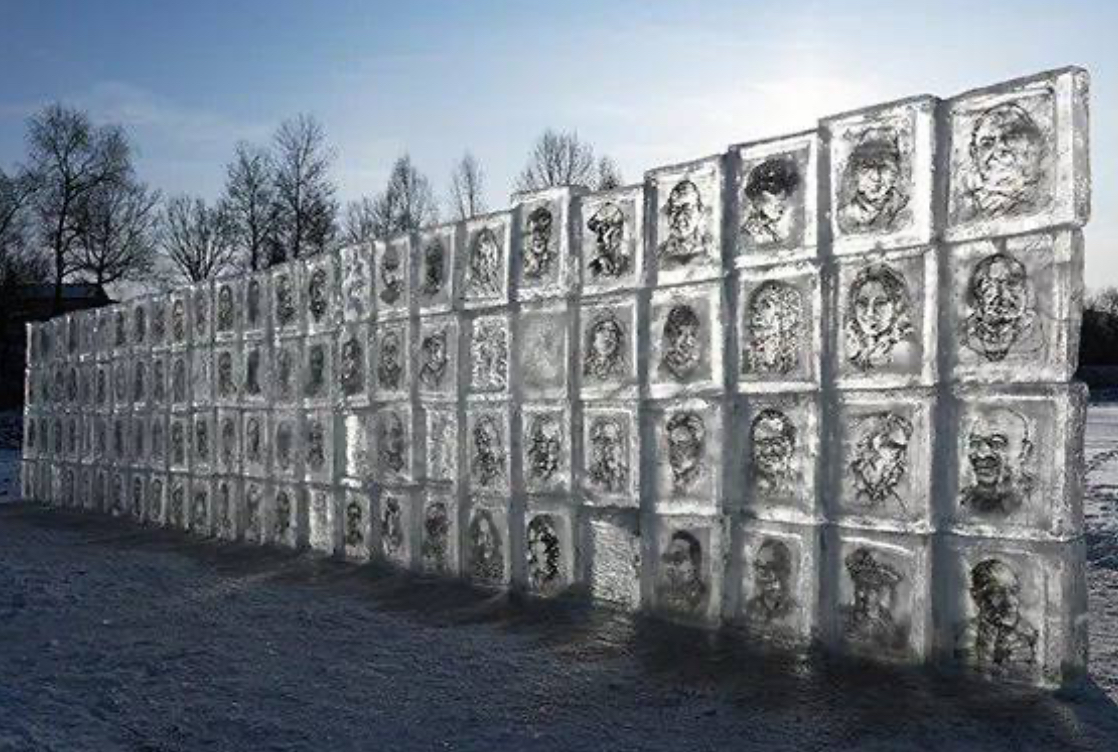
***
Demolish this Wall of Ice, cast it down. Only then will backbones long accustomed to hunching in servitude stand straight once more; eyes cast ever earthward may look up to drink in the world. Perhaps then the blue skies can restore memory. Bodies that once pulsated with human warmth, air that was sweet to breathe, behold that distant flickering light, for in the full glare of day the darkness must take flight and a subtle fragrance will waft up from behind the young woman’s ear.
砸碎冰牆,那早已習慣彎曲的脊樑才能挺直,總是低垂的眉眼才會昂首四顧,藍天便重回記憶。身體原來是熱的,空氣裏有甜味,遠處是燈,黑夜在正午逃遁,少婦耳垂後方襲來幽香一縷。
Shatter this Wall of Ice, release those tormented souls. Freed from the binding matrix may a myriad of streams flow. See the bats now offering their Mass along the weary avenues? Rumours overwhelm all hearing in a tremulous tsunami. The bronze embraces bronze itself, the weeping ink of February put blade to the tyrant.
砸碎冰牆,千萬個魂靈復活,億萬條江河解凍。倦慵的街上蝙蝠在做彌撒,耳語如海嘯顫慄。擁抱一個青銅的是青銅,刺殺那個暴君的是二月哭泣的墨水。
Obliterate this Wall of Ice, for with it the tyrant’s throne too will crumble with a thunderous clap. The blood that flows in the veins of his Myrmidons — that viscose stain long darkened by corrupt decline — will dry up and turn to ash. Under the glare of the burning torches, those luxurious vestments are opened and that golden crown is removed; it is nothing more than a coronet pitched on the head of a performing monkey, filthy beyond words, like a cockroach scurrying along a ditch.
砸碎冰牆,暴君的寶座轟然坍塌,奴隸主血管裏骯髒衰敗的黑血頓時乾涸成灰。火把映照下,剝開華貴皮裘,摘下那金燦燦皇冠,他原來是只猴子,骯髒不堪,如同陰溝的蟑螂。
The Wall of Ice is pulverised. The walls of this bastille are breached and what stampedes forth is a ‘cortège led by a white horse drawing a silver catafalque’. [Note: A line from the contemporary novelist and essayist Wang Xiaobo, who died in 1997.] Pieces of shattered ice are scattered like stars in the Milky Way, or like the sails of biers ferrying between life and death itself. There is a cemetery on the fingertip of the universe that gathers together heroic hearts. Remember, the soaring ramparts of the empire’s keep are heavy with the stench of conquered borderlands. These too are, after all, but wild and passing tempests that signify nothing.
砸碎冰牆,就是撞開牢門,奔湧出“白馬銀車的送葬行列”。冰濺如星,星落天河,如帆船片片,渡越生死河漢迢迢。宇宙的指尖上有墓園一方,收攏魂靈葬于天宇的胸口。脚下帝國的城牆夾帶著邊塞腥膻,噫,原不過走石飛沙。
Demolish this frore barrier. Tonight humanity is struck dumb, but wait, see that slender shaft of morning light pinpointing the glacial river? Blood-waves well up to form a tidal response. The surge crests into a ragged range of snow caps, every mountain peak suffused by a fiery glow. Spring holds promise yet, the wayfarer ventures on, to nurture and nourish a future.
雜碎冰牆,人類今夜集體沉默,但等第一縷晨曦芒刺射向冰河,便有血湧如潮。這大洪水的浪濤啊,捲起千堆雪,掠過萬重山。青春未央,征夫上路,生兒育女。
This day, tonight, my grey-haired fatherland, why are you so stooped, bent by time, your hands wrinkled thus, your face still scarred by furrows of tears? From spring to autumn I cry, I sing, I dance, I urge my horse onwards to ford the river. I drink deeply of the lees as I roam; I would drag the very sun into beehives to make new honey; my prayer is to embrace the echoes of those distant dancing peaks. No, I want the warming zephyr of a millennium of years to caress your face and set aside thereby my own humiliation. Let me rain down in a million drops and wash away the disfiguring traces of teardrops; may that cleansing shower absolve too my shame.
今日今夜,我的白髮蒼蒼的祖國啊,你的身軀為何這般佝僂,你的手臂怎會如此皺叠斑斑,你的臉上難道還要掛著淚痕縷縷?從春到秋,我哭,我歌,我舞,我打馬過江,我痛飲低徊,要把太陽扯進蜂巢造蜜,想在風舞的山巔擁抱雷鳴。不,我要用十個世紀的暖風婆娑你的面龐、拂散我的屈辱,我要用一萬里的雨水拭去你的淚痕、洗儘我的羞愧。
Preternatural fire is burning in the Heavens and there is kindling aplenty on the Earth. Our hearts pulse yet with unassuaged lifeblood. The lost souls are honoured with these ice-made shrouds, the river beneath is an incarnadine torrent of blood. In the combustion that incandescent flame will consume the tangle of barbed wire and incinerate the frozen walls of that city… …
天上有火,地下有柴,心中有血,魂如縞素血如江,燒起來,燒起來,燒毀那鐵網,燒毀那冰封的城墻……
It is a Gengzi Year, the season marks the Flourishing of the Grains. By all rights here, by the Yangtze River, this should be a time of universal renewal.
嵗在庚子,時令谷雨,揚子江,萬物復蘇!
— Drafted on the Pure Brightness Festival of the Gengzi Year [4 April 2020]
Revised during the Grain Rains [20 April-5 May 2020]
On Chaohu Lake [in Anhui] near the Yangtze River
At a time when disasters — natural and manmade —
enveloped the world庚子清明初稿,谷雨改定于巢湖之畔長江之濱,時全球籠罩於天災人禍陰影之下
***
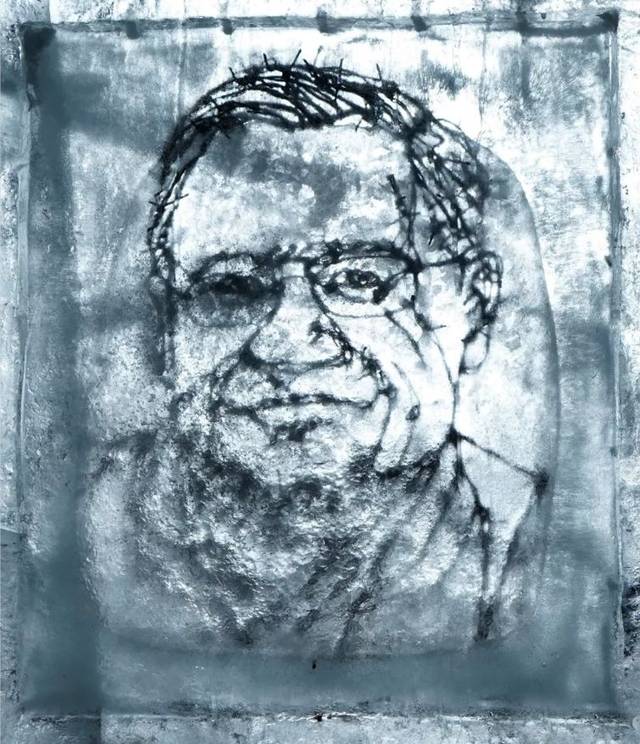
***
Night
Don’t sleep, don’t sleep, my artist,
Do not give in to sleep …
You are a hostage of eternity
You’re a prisoner of time.
Не спи, не спи, художник,
Не предавайся сну.
Ты – вечности заложник
У времени в плену.
— from Boris Pasternak, ‘Night’ Ночь
translated by Roger Pulvers
4 June 2020
***


